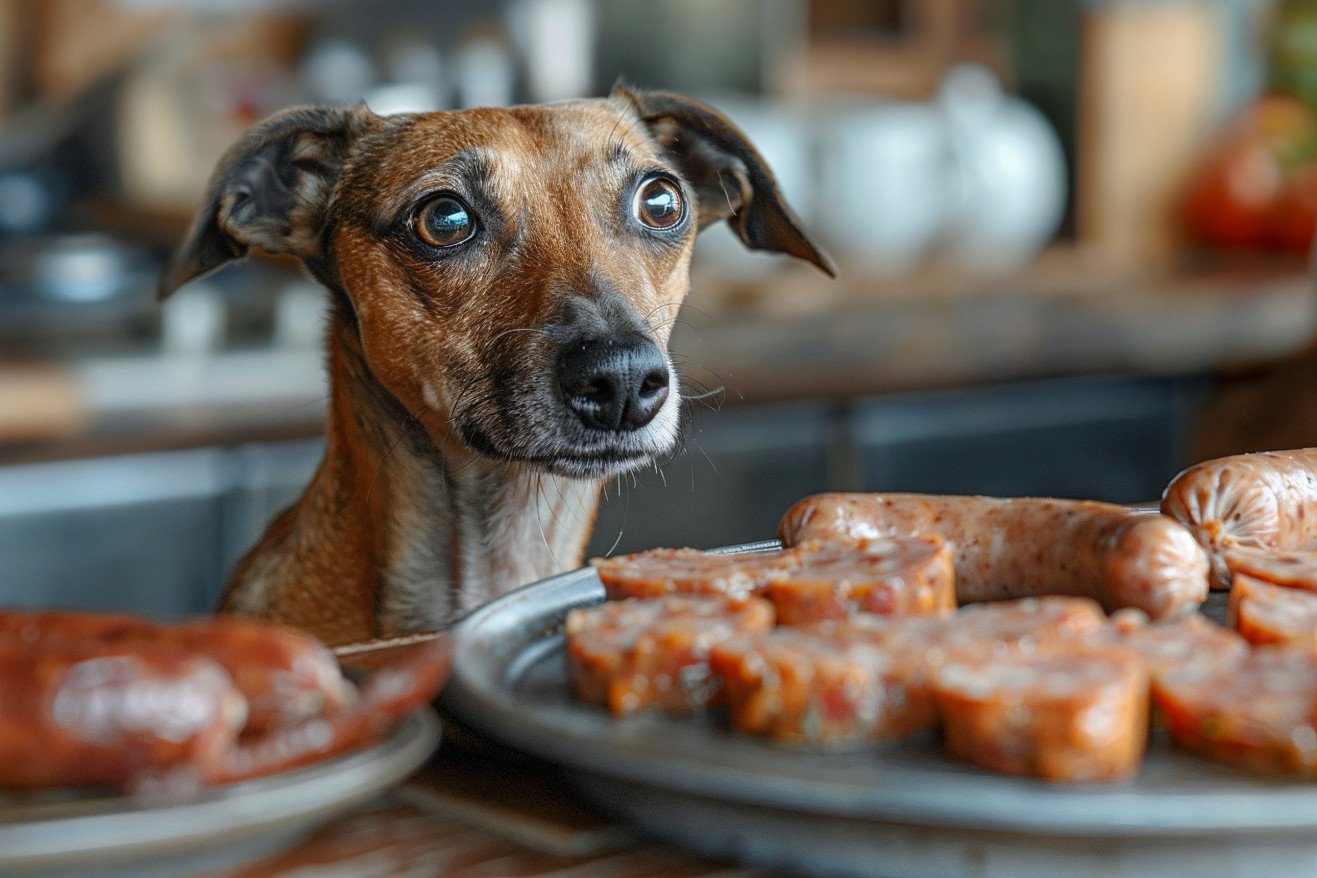Can Dogs Eat Turkey Sausage? Risks and Benefits Explained
4 April 2024 • Updated 4 April 2024

If you're thinking about giving your dog a bite of your turkey sausage, there are a few things you should know. While there are some things to watch out for, turkey sausage is generally safe for dogs in moderation, as long as it's fully cooked and free of seasonings like onion or garlic powder which can be toxic. That said, the high fat and salt content of turkey sausage make it an unhealthy choice for your dog, so it's best to avoid giving it to them or only give it to them occasionally.
By looking at research from veterinarians and pet nutrition experts, you'll learn about the potential risks and rewards of giving your dog turkey sausage. We'll also look at how some of the ingredients in sausage, like salt, fat, and spices, can affect your dog's health, portion sizes, and healthier treat options. By the end of this article, you'll have the information you need to decide whether or not you want to give your dog turkey sausage and how to do it in a way that's safe and healthy.
Can dogs eat turkey sausage?
The Risks of Turkey Bones and Seasonings
While turkey sausage can be a delicious snack for your dog, it’s important to know about the potential risks that come with some of the ingredients. According to The Dog People by Rover.com, cooked turkey bones can break into sharp pieces, causing a dog to choke or suffer from internal damage if they swallow them. The same article says that raw bones can be easier for dogs to digest, but they should still be given to dogs with caution to avoid any issues.
That’s not the only danger, though. Many turkey sausages are made with seasonings like onion, garlic, and salt, which are considered toxic to dogs, according to Rover.com. Onion and garlic can cause damage to a dog’s red blood cells, which can lead to anemia, and salt can cause dehydration, vomiting, and diarrhea. If a dog has eaten turkey sausage and is showing signs of toxicity, including a lack of appetite, dark urine, and lethargy, it’s a cause for concern, according to PetMD.
To make sure your dog stays safe, it’s important to avoid giving them any turkey products that contain bones or toxic seasonings. That said, if your dog does eat any of these dangerous ingredients by accident, make sure to watch them closely for any signs of digestive issues and take them to the vet if you have any concerns. With a little knowledge and some precautions, you can make sure your dog has a safe and happy holiday season.
Controlling Portions and Finding Healthier Options
Even if it's just plain, unseasoned turkey sausage, because of its high fat and salt content, it should still be given to dogs in moderation. As The Farmer's Dog explains, over-feeding anything, even a healthy food like turkey, can lead to weight gain, which has serious health consequences. In general, experts say that treats like turkey sausage should be no more than 10% of a dog's daily caloric intake.
If dogs are overfed turkey sausage or other high-fat treats, it can lead to weight gain, pancreatitis, and other health problems, according to BeChewy. Healthier options to turkey sausage include plain, cooked turkey breast or thighs, or using turkey as part of a balanced, commercially prepared dog food, according to Raised Right. Pet owners should work with their vet to find the right portion sizes and dietary needs for their dog.
How to Prepare and Serve Turkey Safely
If you plan to share turkey with your dog, it's important to make sure the turkey is fully cooked to avoid bacterial contamination. As the Veterinary Emergency Group explains, raw or undercooked turkey can contain bacteria that leads to food poisoning in dogs.
In addition, turkey should be served without any seasonings, sauces, or gravies, all of which may contain ingredients that are toxic to dogs. According to Hill's Pet, the seasonings used to flavor cooked turkey can lead to bowel irritation and digestive upset, including vomiting and diarrhea.
In general, it's best to avoid giving dogs turkey skin or dark meat, which are higher in fat and can lead to digestive upset. According to Daily Paws, the fat in turkey skin can lead to pancreatitis in dogs.
Finally, to avoid choking and overeating, dogs should always be supervised when they're eating turkey or any other human food. By keeping these safety tips in mind, dog owners can make sure their pets can enjoy turkey as a safe, healthy occasional treat.
Symptoms of Turkey Toxicity and When to Get Help
If a dog has eaten a large amount of turkey sausage or another turkey product that contains toxic ingredients, it may show signs of toxicity. According to PetMD, the symptoms of turkey toxicity in dogs can include vomiting, diarrhea, loss of appetite, weakness, increased urination, and urine that is dark or discolored.
In more serious cases, turkey toxicity can cause complications like pancreatitis, which will require immediate medical attention. JustAnswer explains that if a dog is showing signs of distress after eating turkey sausage, pet parents should call their vet or a pet poison control hotline immediately.
Getting help right away can help prevent any further issues and make sure that the dog is treated properly. With close monitoring and the help of a vet when necessary, pet parents can make sure that their dogs stay safe and healthy when it comes to turkey and other potentially dangerous human foods.
Conclusion: How to Make the Best Choices for Your Dog
While unseasoned turkey is a great source of protein for dogs, turkey sausage is a different story. The high fat and salt content, as well as the potential for toxic seasonings like onion and garlic, make turkey sausage a poor choice for dogs.
Dog owners should always check the ingredients of any turkey products they plan to give their dogs and avoid any that contain harmful additives or seasonings. If you do decide to give your dog turkey sausage, it should be in small amounts and only as an occasional treat, not a regular part of your dog's diet.
By weighing the pros and cons, dog owners can make the best choices about whether and how to give their dogs turkey sausage.


